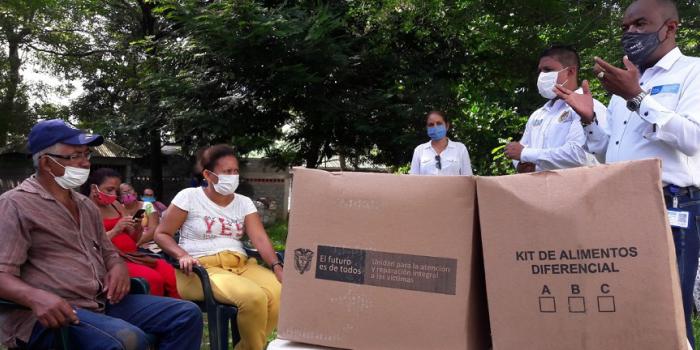
Victims of Bajo Cauca, Antioquia receive food aid to mitigate pandemic deficiencies
1,700 families benefited in this subregion, out of a total of 4,000 prioritized by the Unit for Victims during the health emergency in Antioquia.

Household women, motorcycle taxi drivers, street vendors, and the elderly are among the 1,700 families victims of conflict in the six municipalities of Bajo Cauca, Antioquia, who received food aid due to their vulnerability during the COVID-19 pandemic.
Consuelo Aguirre is one of them. After suffering forced displacement in Urabá, she settled with her family in Caucasia, where at present the family economy has been affected by the quarantine restrictions for the population.
"That is why these aids are well received at this time when they are most needed, because all my husband is a motorcycle taxi driver and that is very limited, and they sold fried on the street, but it is no longer possible as there is risk running out and people avoid buying things like that”, said the woman when she received a box with nutritional products.
In total, the Unit for the Comprehensive Care and Repair of Victims this month delivers 50,000 food kits to families prioritized for their shortages in various regions of the country. Of these, more than 4,000 are distributed in the sub regions of the West, Urabá, Bajo Cauca and Northeast Antioquia.
According to the territorial director in Antioquia, Wilson Córdoba Mena, "the municipalities of Caucasia, Tarazá, Cáceres, Nechí, Zaragoza and El Bagre are among the most affected by the conflict and with the most victims and that is why they were identified by crossing databases these families who had not received any help from other State institutions and we prioritized them to mitigate the deficiencies and the impact of this mandatory preventive isolation”.
She also indicated that "the 1,700 families were chosen by the Victims Unit with the support of the municipalities and the representatives of the population affected by the conflict in each municipality to ensure that food aid is received by the most vulnerable."
Carlos Mauricio Muñoz, coordinator of the tables for effective participation of victims of El Bagre, describes that the beneficiaries “are people who live from day to day, since our municipality is almost entirely a miner and they live on scraping, granite from I pray, then they are very handicapped at this time and these foods are vital for them”.
Meanwhile, the mayor of Tarazá, Miguel Ángel Gómez, acknowledges that “the 290 food kits reach our most needy communities in urban and rural areas to mitigate the needs that are happening right now. He also highlighted that "with this aid they prioritized the six municipalities in this subregion that were badly hit by violence".
In addition, in response to the health emergency due to the pandemic, the entity continues this month with the delivery of more than 11,500 financial compensation and 46,562 money orders for humanitarian aid to care for victims of forced displacement in food and accommodation.
(End/JCM/LMY)






